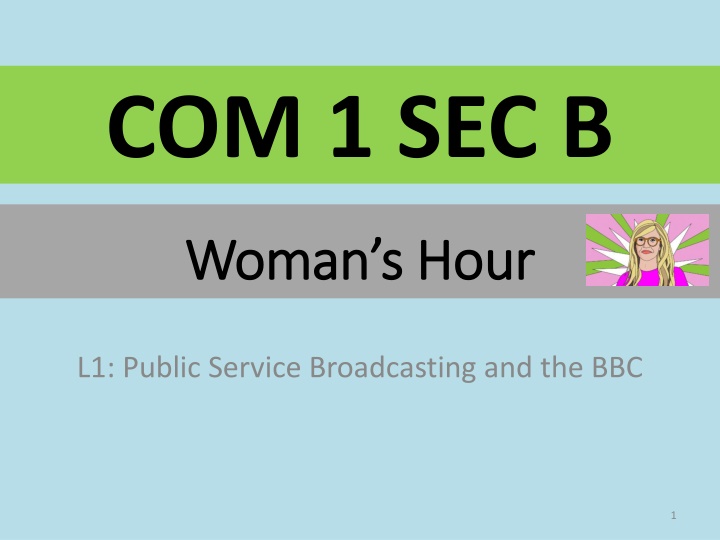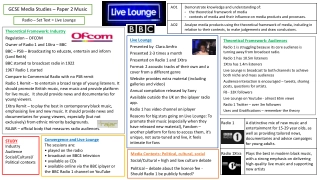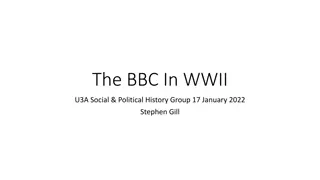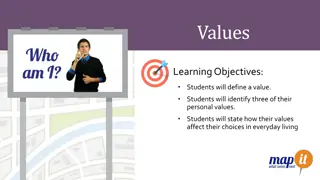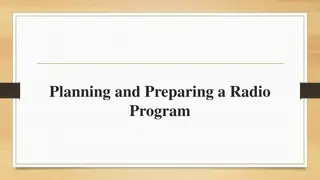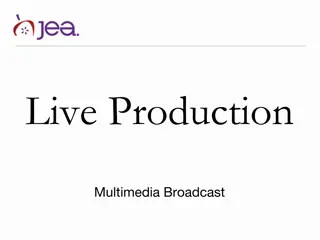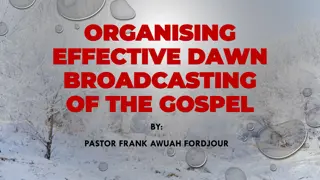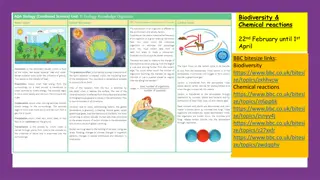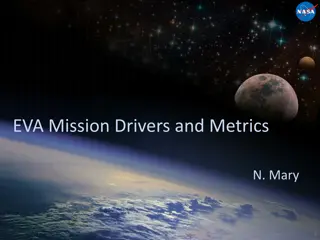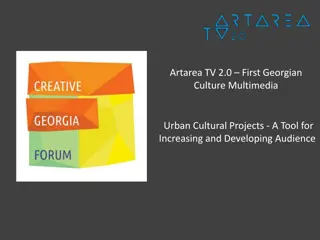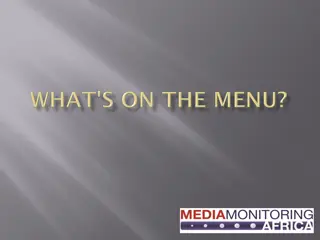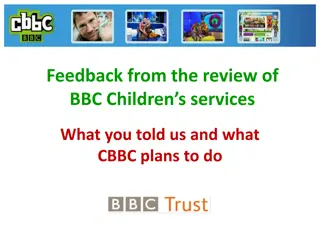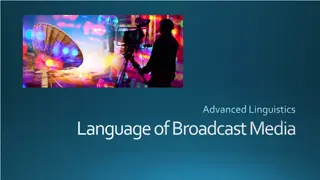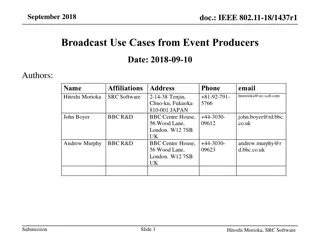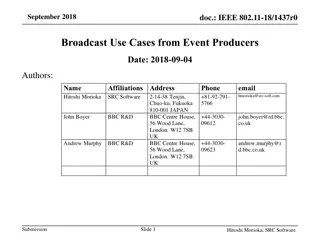Insights into BBC's Public Service Broadcasting and Mission & Values
An examination of the British Broadcasting Corporation (BBC) focusing on its public service broadcasting role, history, remits, mission, and values. The content discusses the BBC's commitment to educate, inform, entertain, and its importance in providing impartial news, supporting learning, and delivering high-quality programming. It also highlights the BBC's unique position as a public broadcaster with a significant influence on UK television.
Download Presentation

Please find below an Image/Link to download the presentation.
The content on the website is provided AS IS for your information and personal use only. It may not be sold, licensed, or shared on other websites without obtaining consent from the author.If you encounter any issues during the download, it is possible that the publisher has removed the file from their server.
You are allowed to download the files provided on this website for personal or commercial use, subject to the condition that they are used lawfully. All files are the property of their respective owners.
The content on the website is provided AS IS for your information and personal use only. It may not be sold, licensed, or shared on other websites without obtaining consent from the author.
E N D
Presentation Transcript
COM 1 SEC B Woman s Hour Woman s Hour L1: Public Service Broadcasting and the BBC 1
Key words REMIT: the task or area of activity officially assigned to an individual or organization.
What do we already know about the BBC? Make a list of everything you already know about it.
Public Service Broadcasting Broadcasting designed to serve the public it is a concept, an approach to broadcasting. The BBC was founded by John Reith in 1922 as the British Broadcasting Company. It later became the British Broadcasting Corporation. It is embodied by the following Reithian principles; Educate, Inform and Entertain All public service broadcasters (and indeed commercial radio/TV) are regulated by OFCOM. BBC, Channel 4, Channel 5, ITV and S4C (a Welsh speaking channel) are all public service broadcasters in the UK.
Channel PSB Remits The BBC has a 100% PSB remit. OFCOM are in charge of ensuring broadcasters keep to their PSB remits. The government grant licences to broadcast, but beyond that have NO DIRECT INFLUENCE on television broadcasting. (In fact, OFCOM give out most of the digital licences these days). The ONLY reason the BBC can meet its huge PSB responsibilities is because it does not rely on advertisers. BBC have no need to ALWAYS win massive audiences: it can put on educational shows, documentaries, special news shows, obscure sports, documentaries, political debates etc. However, with so much competition, it is important that the BBC is able to successfully reach its audiences and prove that they are value for money.
BBC Mission & Values Our mission To enrich people's lives with programmes and services that inform, educate and entertain. Our vision To be the most creative organisation in the world. Our values Trust is the foundation of the BBC: we are independent, impartial and honest. Audiences are at the heart of everything we do. We take pride in delivering quality and value for money. Creativity is the lifeblood of our organisation. We respect each other and celebrate our diversity so that everyone can give their best. We are one BBC: great things happen when we work together.
5 Public Purposes of the BBC To provide impartial news and information to help people understand and engage with the world around them The BBC will provide accurate and impartial news, current affairs and factual programming of the highest editorial standards so that all audiences can engage fully with issues across the UK and the world. To support learning for people of all ages Educational content will help support learning for children and teenagers across the UK, whilst audiences will be encouraged to explore inspiring and challenging new subjects and activities through a range of partnerships. To show the most creative, highest quality and distinctive output and services Innovative content covering many different genres will be provided across a range of services and platforms, setting the standard both in the UK and globally. To reflect, represent and serve the diverse communities of all of the United Kingdom s nations and regions and, in doing so, support the creative economy across the United Kingdom The lives of the people in the United Kingdom today will be accurately and authentically portrayed in the BBC s output and services to raise awareness of different cultures, contribute to social cohesion and invest in the development of each nation s creative economy. To reflect the United Kingdom, its culture and values to the world High quality, accurate, impartial news coverage will be delivered to international audiences, aiding understanding of the UK as a whole.
The BBC The BBC is the most-used brand of media in UK. It is used by 90% of UK adults and 80% of young adults on average per week. Used by an average of five million adults every single minute of the day and night, across TV, radio and online, and by a total of 45 million people across all ages over 24 hours. It is significant and of continued debate that the BBC is funded by the licence fee, a very different funding model from commercial radio that relies on advertising and sponsorship. In 2022, the debate about the licence fee was heightened when Culture Secretary Nadine Dorries announced that the licence fee would be frozen for the next two years, effectively forcing the BBC to make cuts to their programming. There is a demand in some quarters of government for the licence fee model to be reviewed. Others stress the importance of maintaining an independent, impartial broadcaster that is not under pressure to appeal to advertisers. The BBC is considered by many to be a pillar of British life a reliable and trustworthy source, particularly in the days of fake news , whose high-quality products are exported globally. Programmes like Woman s Hour may be deemed too niche for commercial radio. The broadcast has largely female contributors, is predominantly made up of unadorned dialogue (without music, sound effects etc.) and the topics are explored using intellectual and specialised vocabulary. Why would this not be appealing to a commercial broadcaster, reliant on advertising?
How the BBC markets its products BBC Radio utilises a number of marketing strategies to promote its programmes: Cross-platform marketing Billboard and magazine advertisements for stations and presenters. Each station has its own website that allows listeners to access live streaming and to listen to archive footage; they also provide interactive opportunities for an audience and can be reached globally. Social media for each of the stations / promotion via presenters BBC radio produces promotional films focusing on a particular part of its output (for example, its presenters or news coverage) BBC Taster: an interactive service that enables the BBC to showcase experimental ideas and new talent. It allows audiences to give feedback on what they see/hear. It is also a space for the BBC to develop its ideas for digital content and emerging technology. BBC Sounds: Save shows to listen to later, subscribe to your favourites and get fresh recommendations every day.
Review 1. Explain what Reithian values are. 2. What is the mission of the BBC? 3. Is PBS still necessary? Think about the rise of streaming services, podcasts etc
Research Activity Research BBC Radio 4 and 1 more BBC radio station from the list. 1. Who is the target market / audience for this station? 2. How are they targeted? Give at least three specific examples with explanations. Look at the programming and wider advertising for the stations. 3. What range of programmes are offered on each station? Go to BBC Sounds and look at stations and schedules for this information Answer the 5 questions. Make sure you present your answers in an accessible and easy- to-revise way. 4. Which programmes are most clearly fulfilling their PSB remit? Explain your answer. 5. Which one of the 3 BBC principles are most in evidence in which programmes? (Inform, Educate, Entertain)
